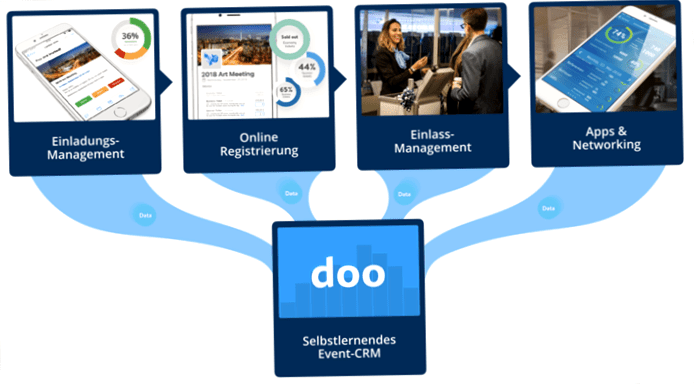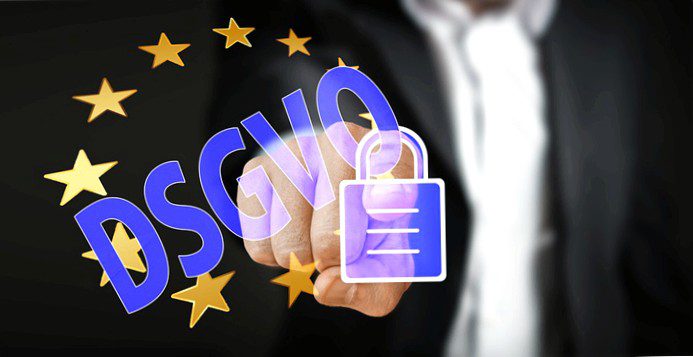Integrating your event management system with other business solutions, such as your CRM, can add real value to your events. It can help you save time and increase your team’s productivity.
Integrating your event management system with other business solutions, such as your CRM, can add real value to your events.
It can help you save time and increase your team’s productivity. Or even improve the ability to share relevant information about your event with the appropriate people in your organization.
It also puts you in a better position to comply with the new GDPR: reducing the risks of a data breach and giving you more control to manage important things like attendee consent or data deletion.
Integration of event data – what is it actually?
Event managers deal with many different systems every day to capture and manage information around their events – from their event and registration solutions to planning, marketing, sales, financing, etc.
A system in which all these different solutions now automatically communicate and connect with each other via interfaces is the basis for data integration.
If you haven’t dealt with interfaces before, think of them as software that works like a door or window. It’s a mechanism that allows your event management system to share data with your event app. Or even your registration system to share new attendee data with your CRM. Or your event payment transactions with your financial system and so on. So it’s a connection of all your existing data, so it’s always up to date and in each of the systems you use, without you having to manually adjust it in each system first.
In recent years, there have already been exciting developments here in integrating data into check-in systems, social media tools and event apps.
However, especially due to the new General Data Protection Regulation, data now needs to be looked at more closely and data protection-compliant integration concepts have recently gained more and more importance. As things stand, this is not likely to change anytime soon and will continue to be a persistent issue.
How data integration can help event managers in their day-to-day work?
The ability to share information in a fully automated way between an event automation platform like doo and other systems, such as CRMs, can bring a number of benefits:
More productivity: increase your productivity by spending less time on (data) management tasks, allowing your team to focus more on other aspects of the event, such as speaker, venue or caterer selection. Keeping your attendees happy and attracting new ones.
Save time: reduce the endless hours you and your team spend manually transferring event and attendee data from one system to another. There are also still many Excel lists being used for attendee management, which require tedious transcription. This no longer has to be the case!
Data accuracy: automatic updates between systems mean you’re always working with the most up-to-date data. This means that there are fewer errors and inconsistencies than with manual transmission paths across different systems and lists.
Better insight and overview: The responsible people in your company have insight into important event and attendee data at all times. This will help you make more informed decisions around your events.

Data integration DSGVO compliant?
The new General Data Protection Regulation (GDPR) has been in effect since 25. May 2018 and is changing the way your event attendees’ personal data is to be collected, processed, and protected. This essentially means that in the future, event managers need to be better informed about what personal data they collect from attendees, where that data is stored, who has access to it, what the data is used for, and more importantly, how to keep all of that data secure.
You need to have much more control over how this information is shared and managed within your own organization now and in the future. This is exactly where data integration can add real value:
Improved data security: it is important to always keep in mind that a data breach can get a company into a lot of trouble in terms of data protection.
Integrating your event management solution with other internal systems will greatly improve the security of your data by eliminating security risks associated with email communications, sending unsecured Excel spreadsheets, manual transmissions and printed documents.
More optimized data management: For example, integrating your event management system with your internal CRM ensures that any personal registration data you capture and change in your registration forms is automatically updated in your CRM as well.
Every employee who has access to both systems now has visibility into the personal data you have about your registrants and event attendees, what consent has been given, and how or. by whom their data is managed. All of this is critical for compliance with the GDPR guidelines.

Many companies have a CRM system, such as Salesforce, that manages all data about their customers and contacts. Integrating your event management system with your CRM ensures a fast and seamless flow of data between the two systems – with all data in both systems always updated at the same time.
Example: one of your subscribers changes their profile in your database or decides to withdraw their consent to marketing activities, such as newsletters. If he now makes these changes, they are automatically updated directly in your CRM. This will ensure that your marketing department no longer sends emails to that attendee, even if they have not been directly notified of the change.
New registrations can be automatically created as leads in your CRM if a subscriber has given the associated consent. Your marketing and sales team is then always up to date on how this data can and should be used.
Now, when an attendee or client asks you to delete all personal data stored about them, all changes are reflected directly in your event management software and also in your CRM. This eliminates the additional manual effort of searching for and deleting the contact in different systems.
In addition, automatic data exchange between the two systems reduces the risk of a data breach by eliminating the need to export registration and personal data to an Excel spreadsheet and manually upload subscriber information to your CRM.
Successful event data integration is simple
Of course, dealing with interfaces and integration models poses a certain technical challenge. You may be concerned that you need dedicated IT staff to implement the technical aspects of an integration project. However, data integration itself is an administrative problem, not just a technical one. Business objectives and the resulting consequences (such as.B. DSGVO compliance) play a supporting role in the design.
For the technical implementation, there are nowadays very simple solutions and tools that greatly simplify an integration into existing systems and for which you do not necessarily need your own IT staff to take care of it. Many companies also offer to integrate their systems directly, so that the responsible employees actually only have to use them.
Whatever data integration project you choose, you need to make sure it works for you and your events. We recommend a thorough conceptual design before you start with data integration. To do this, consider all the challenges and map out the key steps to ensure their integration projects are a success. The design should include all relevant topics, such as the involvement of all stakeholders, the careful consideration of how event data can and should be exchanged between different systems, and the definition of budgets and deadlines.
To avoid problems at the interfaces of your systems and to manage your registrant and participant data in compliance with data protection regulations, we recommend the use of event automation tools that can be directly and automatically connected to the existing systems without much effort. These tools also simplify the organization and secure evaluation of all existing data of your events.
You want to organize your events efficiently, automate your data flows, and always be compliant with data protection laws? We are happy to help you achieve these goals!